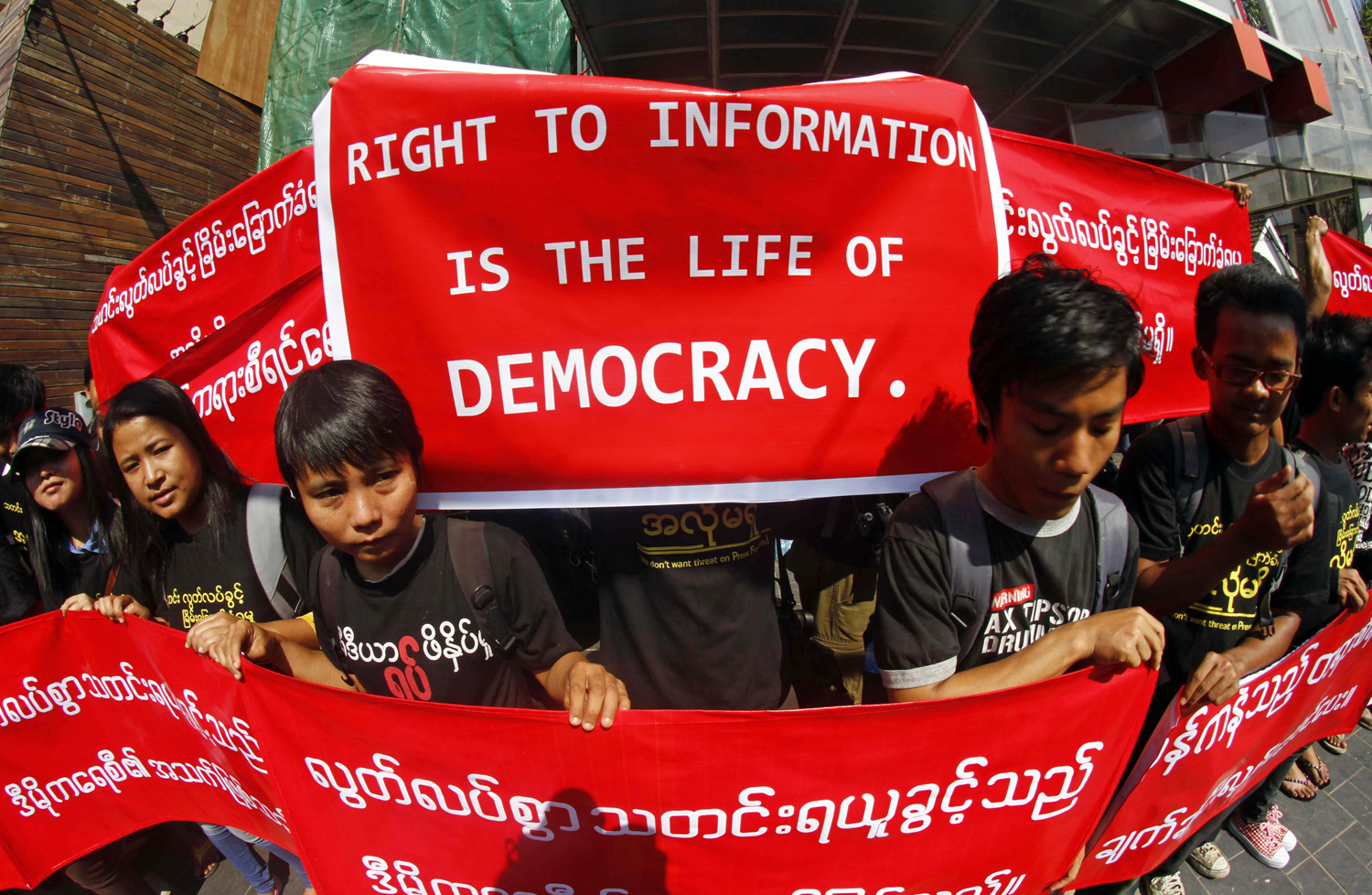
Burma may no longer be a pariah state, but its courts have shown that the government’s authoritarian tendencies are alive and well.
On Thursday, a court in Pakokku Township sentenced the CEO of the Unity Weekly current-affairs magazine, and four of its reporters, to a decade in prison with hard labor for publishing an article earlier this year about the possible existence of a chemical-weapons factory in central Burma.
“This is blatant bullying of media workers by the government’s judicial and executive sectors,” Unity reporter Lu Maw Naing told Burmese broadcaster DVB Multimedia as policemen hustled him out of the courthouse.
Following the publication of the article in January, the government cracked down hard on the periodical. It was hit with a lawsuit by the President’s Office, issues of the magazine were seized and reporters were arrested. The journal was soon shuttered as financial pressures mounted.
While the government has confirmed the existence of the factory, Naypyidaw says it is for standard munitions and denies allegations that chemical weapons are being produced on the grounds. The claims are impossible to independently verify because Burma is a not signatory to the Chemical Weapons Convention.
The former generals at the country’s helm remain sensitive about reporting on weapons programs launched by the former junta. Despite the easing of a smattering of sanctions against Burma in the past two years, several nations, including the U.S., have refused to drop sanctions that target members of the country’s shady military.
Thursday’s ruling is the latest in a series of developments that belie Burma’s reformist narrative. Opposition icon Aung San Suu Kyi remains barred from holding the country’s highest office, the internal peace process is stagnating and the rise of Buddhist nationalism has ripped massive holes in the diverse country’s delicate social fabric.
In addition, the fourth estate now appears to be firmly in the government’s crosshairs. In the past year, reporters from DVB and Eleven Media have been jailed, and in May the government deported a foreign journalist for covering a press-freedom rally. The palpable optimism that wafted over the nation three years ago is waning rapidly.
“I think [this case] shows the true colors of this government,” Aung Zaw, editor of the Irrawaddy news magazine, tells TIME. “It’s a real reminder of the old days under the previous repressive regime.”
During a radio address to the nation earlier this month, President Thein Sein boasted that Burma’s media environment was one of the freest in Southeast Asia. However, he added the caveat that journalists who undermine “national security” would be punished.
“[If] media freedom threatens national security instead of helping the nation, I want to warn all that we will take effective action under existing laws,” said Thein Sein, according to a state-run publication.
Just a week later, the threat became reality for the reporters of Unity Weekly. The administration relied on the colonial-era Official Secrets Act to wallop the journalists rather than prosecuting them through newly passed media legislation.
“The authorities are clearly shifting from rule of law to rule by law,” says Benjamin Ismail, head of Reporters Without Borders’ Asia-Pacific desk.
“They are just trying to justify their censorship and repression of the press by showing the international community that legal procedures are followed and everything is normal.”
Editors on the ground say the financially ruinous lawsuit launched against Unity is part of the government’s elaborate strategy to silence dissent. With myriad publications struggling to keep their head above the water in the impoverished country, any legal action could prove disastrous.
“There’s a clear glass ceiling from the owners or the business side,” says Toe Zaw Latt, DVB’s Burma bureau chief. “Once there is trouble, of course you lose money.”
Harassment of editors also appears to be on the rise. In the past two weeks, numerous press offices have reportedly been party to unannounced visits from officers from the military’s special branch.
“They come to our office and other media offices asking petty questions: ‘How are you making money?’ ‘Are you making a lot of business?’ ‘Are you making a profit?’” says Aung Zaw. “It’s clearly intimidation.”
More Must-Reads from TIME
- Why Trump’s Message Worked on Latino Men
- What Trump’s Win Could Mean for Housing
- The 100 Must-Read Books of 2024
- Sleep Doctors Share the 1 Tip That’s Changed Their Lives
- Column: Let’s Bring Back Romance
- What It’s Like to Have Long COVID As a Kid
- FX’s Say Nothing Is the Must-Watch Political Thriller of 2024
- Merle Bombardieri Is Helping People Make the Baby Decision
Contact us at letters@time.com